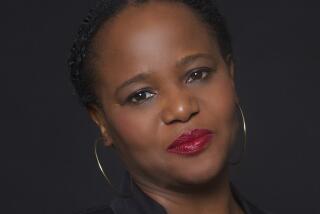Love story
- Share via
There is no guarantee that a distinguished fiction writer will produce a successful memoir. Yet Edwidge Danticat -- the author of three elegant and complex novels, including “Breath, Eyes, Memory,” and the story collection “Krik? Krak!” brings the same lucid storytelling to “Brother, I’m Dying.”
On the same day in 2004 that Danticat joyfully discovered she was pregnant with her first child, her father, a 69-year-old Brooklyn taxi driver, was diagnosed with end-stage pulmonary fibrosis.
Months later, her uncle Joseph, a Baptist pastor who had raised Danticat in Haiti during much of her childhood, was forced to flee the riot-torn Port-au-Prince neighborhood in which he had lived for more than 50 years. Age 81 and ailing, Joseph flew to America to stay with his brother’s family but was unjustly detained by the Department of Homeland Security in Miami, where, under harsh conditions, he died in custody.
Revisiting this “wondrous and terrible” intersection of events, and roaming backward through the history of her family and her native country, Danticat struggles to fashion a cohesive narrative. Like a burial, her account is a final, loving act on behalf of her father and uncle. “I am writing this,” she flatly states, “only because they can’t.”
If rigor is elusive in such an intricate account -- one that expands outward to include the history of U.S. involvement in Haiti since 1915; violence and fear during the Duvalier reign and beyond; and post-Sept. 11 immigration policy -- emotional clarity is abundant.
It thrives, as it does in all of Danticat’s work, in small, piercing scenes. In 1973, her mother leaves Haiti to join her father in America, leaving 4-year-old Edwidge and her younger brother to be raised by Joseph and his wife. The airport goodbye is excruciating: “I wrapped my arms around her stockinged legs to keep her feet from moving. She leaned down and unballed my fists as Uncle Joseph tugged at the back of my dress, grabbing both my hands, peeling me off her.”
On the streets of Port-au-Prince, when she’s 9, Danticat serves as her uncle’s interpreter after throat cancer and a laryngectomy render him mute. She agonizes for him as neighbors gawk at his tracheotomy hole. “[A]ll I could think to do was imagine a wall around him, a roaming fortress that would follow him everywhere he went and shield him from derision.”
At age 12, Danticat and her brother reunite with their parents and two U.S.-born younger siblings in Brooklyn. As she matures in America, she retains her role as the family voice, telling its stories, interpreting its dreams and nightmares as she had once spoken for her wordless uncle. In the Miami mortuary where Joseph lies in November 2004, “exiled finally in death,” the funeral manager tries to persuade the pregnant Danticat not to view the body. She disregards him, recognizing that “the dead and the new life were already linked, through my blood, through me.” They’re linked through her eloquence as well, for as she says, citing a Haitian folk tale, “[I]t is not our way to let our grief silence us.”
More to Read
Sign up for our Book Club newsletter
Get the latest news, events and more from the Los Angeles Times Book Club, and help us get L.A. reading and talking.
You may occasionally receive promotional content from the Los Angeles Times.






